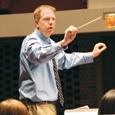As part of our 70th anniversary celebration, we asked some great teachers to discuss lessons learned during their careers, memorable students and moments, changes they would make to music education, and the keys to a balanced life. There were so many great answers that we divided the project into two parts. We appreciate the work of everyone who contributed to this project.
Lisa Martin
Bowling Green State University
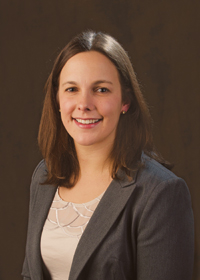 Most Memorable Student
Most Memorable Student
As a middle school director, I inevitably had a slew of incoming 6th grade students who wanted to switch to percussion. I was always resistant. One year, I had a student who played trumpet (and struggled quite a bit with it) who was particularly persistent about switching to percussion. He had been taking private lessons on percussion, so after the winter concert I conceded. Looking back, it was a wildly awesome decision. Not only did he flourish as a concert percussionist, he was the strongest set player I ever had.
However, it wasn’t his performance skills that made him memorable – it was his love for jazz, so much so that, in his eighth grade year, he rallied four other boys to start a jazz combo. He alone motivated them to come in before school at 7 and after school on Fridays for rehearsals two times a week, and he would occasionally bring donuts as a thank you. He coached his friends through improv and pulled up recordings made by some of the greats to help inspire them.
The group was completely student directed. I was just a fly on the wall, and I learned so much from his leadership. What I loved most was how the first words out of his mouth were always encouraging. The others would often fumble through solos, but afterwards, he’d always say things like, “Hey, you did a really good job. That was so much better than last time. Maybe this time, think about including more space. Want to try it again?” His approach really made me think about the first words out of my own mouth after I cut off ensembles, as well as the atmosphere in our classroom. Although he was open to new ideas (I’d occasionally chime in), he stood his ground when he felt strongly about certain musical decisions, and he would cite various recordings or artist interpretations to justify his thoughts. He created such a safe, collegial culture among the group, and they did amazing job at a local jazz festival later in the year. He was an incredible musician and teacher who was wise beyond his years.
Most Important Skill
I have always been a yes person. Like many music teachers, I am quick to agree to tasks even at times when I’m already stretched too thin. Over the years, I have definitely learned to set priorities so I can be my best self in whatever it is I choose to do. Doing 100 things at 50% is no good for anybody; I’d much rather do fewer things very well. This sometimes means I have to say no, but this approach has also helped me become a more creative problem solver.
Related to that notion, I also have always struggled with a need to be in control. There was definitely a time I tried to do everything by myself. That phase was, thankfully, short-lived. Learning to ask for help and embracing those that reach out to you and your program can do wonders for alleviating stress and burnout.
One Change for Music Education
I would encourage music education programs to branch out beyond the standard ensemble and Western art music traditions, to embrace and celebrate a wider variety of music and music-making. As a product of a traditional K-12 band program, I certainly value what that experience can provide, but I am concerned that our emphasis on that tradition excludes other musical opportunities and value systems.
Greatest Memory
Even before I had any formal school music instruction, I remember listening to my mother play piano in our living room. I’d flit about the house on my tiptoes as she played cascading melodies, pretending I was a leaf blowing in the wind. I’d move deliberately, with weight and a furrowed brow, when the melodies shifted to minor. There was something authentic and uninhibited about simply reacting to and embodying those sounds before I understood how and why those sounds were put together. It was a blissful adventure-mystery. When I get bogged down with the stressful aspects of my job, I like to recall the feelings I had in those moments. The memory grounds me. It reminds me what this is all about.
Steve Katzenmoyer
Fleetwood School District Pennsylvania
.jpg) Most Memorable Student
Most Memorable Student
I taught a student who later went on to earn a PhD in astrophysics and works for NASA. Even when he was just 9 years old, I constantly had to create lessons to challenge and motivate him. He absorbed music differently than most other students, and I learned a lot about how to teach exceptional children through him.
Most Important Skill
Not all students learn music the same way. If you teach music, chances are you are in the top 1% of the general population in what John Gardner might call musical intelligence. Few of our students are like this, and I’m constantly evaluating how to best teach those students.
One Change for Music Education
More time with my students.
Greatest Memory
My first conducting job was directing a pit orchestra. On opening night, the lights came down, the spotlight came on me, I walked confidently to my place in the pit, took my bow right into the steel bar that was supporting the orchestra pit curtain.
Balance of Work and Personal Life
I’m still working on it.
Chris Gleason
Patrick Marsh Middle School
Sun Prairie, Wisconsin
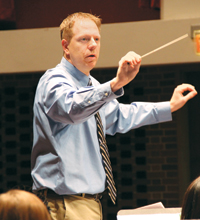 Most Memorable Student
Most Memorable Student
Mike played trombone in my 7th grade band during my second year of teaching. He wasn’t the most skilled player, but he was the most gifted musical thinker I have ever had. Mike would not only demonstrate understanding of the content we were covering in class, but also analyze the strategies I used to teach the content. I enjoyed Mike’s curiosity and deep questions. He often looked beyond the written notes to uncover a deeper meaning or truth to the work.
Most Important Skill
Learning how to analyze music has helped me the most in my teaching career. This skill has given me the tools to select better repertoire, delve into each element of music, articulate the heart of each piece, and create clear outcomes for my ensembles. Analyzing the music allows me to get out in front of the students so I can help lead them to greater understanding rather than being reactionary and wishing time would move faster during class.
One Change for Music Education
The most precious thing we have is time – time with the students, analyzing music, developing varied teaching strategies, and reading and gathering new ideas. We are all so busy with the management of our programs that we sometimes lose sight of (and fall short in caring for) our students, colleagues, and ourselves.
Greatest Memory
The world premiere of our first commissioned work, Blue and Green Music by Sam Hazo, occurred at the Wisconsin State Music Conference in October of 2009. Sitting in the audience was a relative of Georgia O’Keeffe and her family. It was evident that the music and our tribute to Georgia O’Keeffe touched them. It was an unbelievable moment.
Balance of Work and Personal Life
I manage this balance through organization. Planning my time helps me to become more efficient and effective. As Benjamin Franklin said, “By failing to prepare, you are preparing to fail.”
Kevin Schoenbach
Oswego High School, Illinois
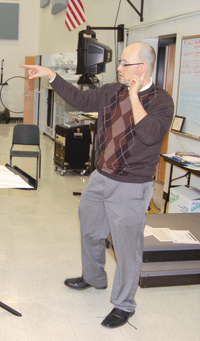 Most Memorable Student
Most Memorable Student
I have had many memorable students over the years, but two that really stand out. The first student could have been an exceptional player if he had stuck on his main horn, the saxophone. However, he wanted to play as many of the instruments in the band on a concert as he could. He was so passionate that I could not say no. In his sixteen band concerts at our school, he performed on thirteen different instruments. I stopped questioning him his senior year, when he said it was the bassoon’s turn. I was skeptical, and told him some of the reasons why bassoon was one of the toughest instruments, but he was undeterred. He learned all of his major scales in eighth notes over the weekend.
The other student that sticks out was a trumpeter who had muscular dystrophy and was permanently in a wheelchair. His tone was pinched and constricted because of his condition, but no one cared. He loved the band, and his spirit was absolutely infectious, and far more valuable than his musicality. I pushed his wheelchair at parades, because he would not be denied playing in the marching band.
Most Important Skill
You need goals every time you get in front of students. My colleague writes them down and has a running list of things she wants to accomplish. She plans out every measure she wants to work on and how she wants to do it. In my younger days, I knew what I wanted to do, but spent little time thinking about how I was going to do it, resulting in inconsistency in rehearsals.
One Change for Music Education
I want to change the mindset of many administrators about the value of music in the school day and that the true value of something cannot be measured with a test score.
Greatest Memory
I had saw Maynard Ferguson play at the Jazz Showcase in Chicago when I was a junior in high school. We arrived a little late, but the usher set up a couple seats right on the edge of the stage. The trombonist, Tom Garling, emptied his spit valve on my shoe (accidentally), which was awesome. Being that close to music that good really invigorated me, and caused me to dedicate myself to my instrument in a way I had never done before.
Balance of Work and Personal Life
I am still working on this one. A lesson I have learned recently, being a performer as well as an educator, is not to take gigs during weeks where I will be at school late many nights. My wife enjoys seeing me occasionally.
Anthony Pursell
Tarleton State University, Texas
.jpg) Most Memorable Student
Most Memorable Student
As a first-year band director in 1996, during my first week on the job of summer band camp, I met a junior clarinetist named Jason. After all the other students went home for the evening, Jason came to me after the first rehearsal and asked, “Mr. Pursell, are you going to be here next year? Because if not, I don’t want to do this anymore.” Prior to my arrival at the high school, three band directors came and went, one year after another. After some investigating, I learned that one of the two middle school feeder programs had a new director several years in a row, and I was Jason’s seventh band director. Those words haunt me to this day, almost 20 years later and proves the impact that our profession can have on students and their sense of self-worth.
Most Important Skill
Quite simply, I have learned how to work with people. Whether it is a parent, administrator, or student, working with the public teaches you many things. Perhaps the most important of these is understanding. It is true that many students we teach may not be practicing 30 minutes each day because mom works the third shift and dad needs to make calls at home for his job after hours. The student may not get any needed attention because of this situation and, in many respects, we might be the only stable people in the student’s life who show a genuine interest in them. This was a hard lesson for me at first as I was a band kid and I believed that all my students would have the same drive and dedication that I had and currently have. Many do, but many face difficult situations on a daily basis.
One Change for Music Education
I wish the competitive atmosphere that surrounds music education would be tamed somewhat. I am 100% in support of festivals and competitions, as this may be one of the safest places to learn how to deal with failure through a poor rating. At some point we will all face disappointment. There is no better place to learn that lesson than with a group of people who, by nature, will work together to make the situation better the next time. In fact, we do this day in and day in our rehearsals.
My concern about the vast amount of competitions some programs participate in is that it takes a lot of the compassion and desire away from the student – music becomes a full time job. By the time some of these students attend college, many non-music majors will not continue in music regardless of how successful the university music program is. There are students who would rehearse and perform 24 hours a day if given the opportunity, but a good majority of them are simply looking for an outlet and enjoy the experience. My wish is for directors to find higher quality experiences for their student that will reward hard work, instead of attending contests each and every weekend.
Greatest Memory
My wind ensemble performed at Carnegie Hall in April 2014. For many students, it was their first opportunity to leave the state of Texas. For my university, it was a first to perform at a venue like this in the concert setting. At the conclusion of the second-to-last work, I turned around and we had a standing ovation. My thought was, “I hope they know we have one more scheduled work on the program.” After we performed our final work, we received another standing ovation. For a program that had so much turnover in faculty at one point, I was never more proud of my students for how much they grew. From the announcement of our acceptance to the performance on stage, each performance throughout the year got better and better. The students stood a bit taller that evening walking down 57th Street.
Balance of Work and Personal Life
I have two children, ages 9 and 10, and my wife of 13 years. Maintaining balance between the job and family is difficult to do. I am writing my responses for this article in my office, and my 10-year old son is in the front office playing on my laptop computer. I simply have to get creative when I am able. During the school year this is not as big of a problem as the two kids are in school. My wife is a school teacher, and we have a similar schedules. There are opportunities that I have to miss with my kids. Fortunately I have a colleague who understands the importance of family and will often help out so I can attend an event in which my son or daughter may be participating.
I find it is very important for me to spend time with all three of them no matter what. For my daughter, I am learning how to braid hair on her dolls and for my son, we play on his Xbox every now and then. I will admit that I am absolutely terrible at FIFA Soccer and my hairstyling career has a slim chance, but the time I give to them with their specialty is what counts. I am also thankful that my wife is a former band person as she can understand the life to support my crazy schedule and responsibilities.
Marshall Forrester
Charleston Southern Univ.
South Carolina
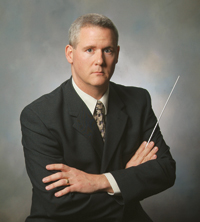 Most Memorable Student
Most Memorable Student
My most memorable student was not very memorable during his first year. He did his job, and I suppose he did it very well. By his third year, however, I noticed that when he appeared around the rehearsal hall or office, problems were resolved, and instruments and equipment were cared for. He had an uncommon talent for musical, social, and administrative logistics, as well as more mundane things like equipment repair. He graduated at mid-year, and because there were no teaching jobs available in January, he took a job with a local music dealer. (It was a great deal for him and for the business. I’ve since had several other students take this route, and they learned much on the job that ultimately made them better band directors).
During the next 18 months he had several job offers, but he refused to take “just any job.” Finally an acceptable job offer came, and the rest is history. He went on to build incredibly successful middle and high school band programs. I hired him often to teach or perform administrative jobs at camps and clinics. It wasn’t long before the area band director’s association elected him to organize auditions and clinics as well. I learned more from this student about persistence, creativity, and ingenuity than he ever learned from me.
Most Important Skill
If teachers are constantly trying to improve, they will always be concerned with efficiency. You learn over time that efficiency always involves using fewer words, but not necessarily the fewest words. For example, quickly listing a series of corrections in rehearsal is not always best. We all learn more efficiently when we receive both positive and corrective instruction. For students, knowing both what was musical and what needed improvement is vital. Therefore, teachers need to provide both kinds of feedback.
When you detect an individual or section demonstrating great musicianship, an enthusiastic compliment will be memorable, and the same behavior will soon be imitated by the other sections. The lesson is: If you hear something remarkable, make a remark. Something we do not consider that six weeks of rehearsal consisting solely of the conductor trying to correct every mistake creates a bland, uninspired product. Interpretation or musicianship does not fit into this approach. Inspired ensemble rehearsals do not and can not work like a sculptor chiseling away everything that does not look like a statue. Accentuate musicianship and even technical achievement with positive remarks.
Another realization that is counterintuitive to the use-the-fewest-words mentality has to do with reading a new piece. I’ve seen well-meaning clinicians say in the first honor band rehearsal, “we’re just trying to get through it tonight.” This is absolutely the wrong approach. First try to get everyone on the same page, and after this all can benefit from the big-picture approach.
For example, I conducted Lincolnshire Posy for the seventh time this spring. When reading Lord Melbourne I had the presence of mind at the end of the first two fanfares to say “we’re at measure 2, I’m giving a quarter note pickup, and in the odd measures I’m directing eighths.” I said something similar at the beginning of every new section. Speaking like this in a calm, reassuring voice can work magic on an ensemble’s gestalt comprehension when reading a conceptually difficult piece. Just a few more well-spoken words will greatly benefit the rehearsals and performance weeks later. Learn to guide and teach and reassure during the first two hours of rehearsal with a few more than just the minimum words possible.
One Change for Music Education
I would change the attitude towards music education in this country. So many administrators, parents, and members of the public have no idea of the equipment, time, organization, and dedication necessary to operate a music program. More importantly, they have no idea of the benefits that accrue to students, families, schools, and communities. For every good story we hear about a football coach or town official supporting music, there is another story about a school or district cutting back or eliminating arts funding. I do believe we are making progress, and I support efforts to increase awareness. To change attitudes permanently, we would need to change the participation rate every year for a generation. I think we could double the participation rate from around 17% to 35%. This will require a collective 20-year effort, but the change would be enormous and virtually permanent.
Greatest Memory
Some unforgettable moments include successes of former students on stage and in the classroom. When the proverbial 1 out of 10 students returns to express sincere gratitude, that is a professional satisfaction that can never be surpassed.
Balance of Work and Personal Life
It helps that we share the lifestyle of musicians. We are a brass-playing family and enjoy playing gigs together and in church orchestra. It also helps that a good number of the band and orchestra clinics I attend have involved my kids lately. We also try to enjoy non-musical things as a family. My oldest son has my love of history and politics, and we have lively discussions. Our daughter chose creative writing as her focus at School of the Arts, and we go to all of the poetry and prose readings and exhibitions. Our middle son helped me write code for a Scandinavian amusement park database project that brought our entire family to Norway and Sweden this summer. It’s vital to get away from the grind of the job for a short time, because it always leaves me refreshed and ready for more conducting and teaching.
Christopher Grifa
Creekside Middle School
Carmel, Indiana
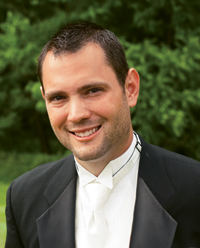 Most Important Skill
Most Important Skill
The most important technique that I have learned so far is the value of teaching my students how to play their instruments with strong fundamentals and working on those fundamentals every day. Taking the time for fundamentals daily has completely changed the sound of my groups.
One Change for Music Education
I would make music education accepted as a core class along with math, science, English, and history. I believe that every student should have an opportunity to experience music education.
Greatest Memory
I will never forget the moment when our students realized just how huge performing at the Midwest Clinic really is. It is hard to pass on to middle school students how huge and important it is. I will always remember walking into McCormick Place for our rehearsal as our students realized that all of their hard work and dedication was worth it. They had an amazing experience that I know they will never forget.
Balance of Work and Personal Life
This is difficult to do in our profession, especially with all of our after school commitments. I try really hard (sometimes successfully and sometimes not) to be focused on what I am doing at that moment in time. If I am at school it is focusing on my students, if I am playing with our puppy, Mickey, I am focused on Mickey, If I am watching one our favorite TV shows with my wife, Suzy, then I am completely focused on hanging out with her. We are always going to have to take work home as our job is never done, but it is important take time for yourself and do something you enjoy every day.
* * *
Favorite Music Apps
Christopher Grifa: The TonalEnergy Tuner is fantastic app that can help teach your students intonation and listening. It can also help your students understand just versus equal temperament tuning. You can easily build and sustain any chord in either tuning to help students hear how the chord is supposed to sound when perfectly in tune. It also has a metronome feature and recording capabilities. This is the perfect app to use during class also good for students to use at home. (Several respondents mentioned their use of the TonalEnergy Tuner app.)
Chris Gleason: AnyTune Pro is one of my favorites. This app allows you to change the tempo and pitch of any mp3. It also allows you to mark rehearsal spots in the recording and create step-up practice drills. Coach’s Eye is a fantastic app to for physical skills. Like the coach’s clicker seen on TV, the user can record a musician, then analyze the video using a variety of tools while making recorded comments. The new video containing the analysis can then be shared with the student via email.
Marshall Forrester: There are certainly many apps that help with musicianship or administration. However, relying on a tuner rather than one’s ear invites problems with blend. So many times the fundamental pitch can be in tune but the overtones are sharp, or vice versa. I like apps that give feedback to the musician after the fact. Trying to measure while playing can alter the conditions of the measurement. So, for example, when diagnosing timbral issues caused by overtone intonation versus instruments of different tessituras, I like to characterize the problem (e.g. “sounds bright”) and then use iStroboSoft to see the nature of the problem (e.g. “Overtones are sharp”), but only after my ear has alerted me that something doesn’t match.
Similarly, when questioning my own tempo choice I will use Tap That after the fact to measure my exact tempo. I enjoy technology as much as anyone, but I think it needs to be said that phones on students’ music stands can significantly impact rehearsal attentiveness. Even if using a musical app, notifications will pop up that can destroy momentum in a rehearsal. This is another reason it is better to use these apps in individual practice rather than in rehearsal.
Kevin Schoenbach: Google Play is a great app that stores your entire music library for free in the cloud; this enables you to always have access to all your songs, and if you want to play a recording for your students, you always have it.
Jim Shaw: Timer with Sections and Woodwinds (fingering and trill charts)
Samantha George: I am old school. The only technology I use is a video camera so that students can watch and hear themselves play.
